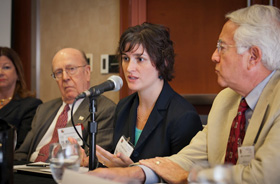Sandra Fluke Reflects on Lawyers, Civility and Her Brush with Rush Limbaugh

Sandra Fluke (center) speaks about civility in the
profession. Photo by Kathy Anderson
Updated: In the months since Sandra Fluke found herself the center of a media firestorm over the state of public discourse after radio personality Rush Limbaugh attacked her personally because of her views on providing insurance coverage for contraceptives at religious institutions, the aspiring lawyer has embraced the platform.
Fresh from the California bar exam, the Georgetown University Law Center alum said the experience gave her the chance to think more deeply about political conversation and a lawyer’s role in that arena.
“It’s been interesting to see the push and pull of discourse that various stakeholders want each of us to engage in,” Fluke said. “At times, it can feel like there is a pressure from folks working on the communications side of public policy efforts to really make things as simple as possible, sometimes as inflammatory as possible, because those are the types of things that can get attention.”
Instead, she says she’s tried to hold firm to her belief that political conversations should keep consequences in mind. And when political discourse gets detailed, she’s come to understand that those details need to be explored.
“My legal education, I think, has been helpful in that way because it really is a training in how to marshal facts in a passionate way—but by using facts, not just engaging in broad blanket statements and mischaracterizations,” she said.
Fluke’s comments were part of a panel discussion, “Rush Limbaugh and a Law Student’s Encounter with Incivility; What is the Role of the Legal Profession?” on Friday at the ABA Annual Meeting in Chicago.
Fluke’s comments on political discourse were a jumping-off point for the program, but much of the discussion centered on lawyers and their relationships with fellow members of the bar, judges and clients.
Arizona lawyer Patricia Refo says the easy part is identifying when someone else is being uncivil. Like “when opposing counsel screams the b-word and slams the phone down. That’s pretty uncivil,” said Refo, a veteran litigator and former chair of the ABA’s Section of Litigation.
And she noted that it’s also not so difficult to keep a check on one’s own behavior. Refo thinks of her children and asks herself if she’s “behaving in a way I would want my child to see me behaving.”
Along those same lines, Gene Shipp of the District of Columbia Bar’s Office of Bar Counsel said he regularly tells lawyers to consider their conduct, then ask themselves, “Would your mother be proud?”
The trickier part of civility most often comes into play when clients pressure their lawyers to take a more hostile approach. Refo says she’ll hear clients tell her to be “really aggressive.” Or they will get upset if she appears to be nice to opposing counsel.
At that point, the issue becomes one of client education, she and other panelists agreed.
Refo says she explains that being nice doesn’t in any way mean she’s not protecting her client’s rights or acting against the client’s interest.
And she and others noted throughout the program that lawyers need to realize that being civil is in their best economic interest. The proof is in the referral from opposing counsel, sometimes months, sometimes years down the road.
Other panelists participating in the program, sponsored by the Section of Dispute Resolution and moderated by Arizona mediator/arbitrator Bruce Meyerson, included Professor James Alfini, dean emeritus of South Texas College of Law, who spoke about what legal educators can be doing, and 7th U.S. Circuit Judge William Bauer, who talked about judges setting a model and noting that “trickle down civility is important.”
Last updated Sunday to add more detail, correct wording in the first graph and add names of other panelists.


